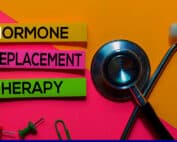Featured
Bioidentical Progesterone: The Natural Hormone That Helps You Feel Like Yourself Again
Do you ever feel like your body is working against you? You’re snapping at people you love. You can’t sleep even though you are tired and awake at 3AM. Your jeans don’t fit. And your brain feels like it’s stuck in a fog.
You’re not the only one who feels this way. These and about 70 other symptoms happen to millions of women during perimenopause and menopause. The good news is- Bioidentical progesterone is a natural and safer way to get your life back on track to balance estrogen and keep you calm, help you sleep and avoid symptoms of estrogen dominance that are common in PMS, post-partum, perimenopause and menopause.
In this post, you’ll learn what bioidentical progesterone is, how it works, and why it might be exactly what your body needs.
What Is Bioidentical Progesterone?
Hormone replacement therapy (HRT) with bioidentical progesterone uses hormones that are exactly like the ones your body makes. Bioidentical hormones work with your body, unlike synthetic progestins that are found in older medicines. This is important because not all hormone treatments are the same.
Why Are Women Afraid of Hormone Therapy?
A lot of women are still scared because of the Women’s Health Initiative study from the early 2000s, which has since been shown to be wrong. That study gave women over 63 years old high doses of oral, synthetic hormones. Oral estrogen and synthetic progestins cause clots, decrease the heart protective benefits of estrogen, can cause gallbladder issues and have some unwanted side effects.
But now we know that bioidentical hormones are the safest and most effective hormone therapies. – Timing is important: HRT is most beneficial when started early. Women may need progesterone during perimenopause that can be up to 10 years before menopause when they run out of eggs or cannot make sufficient progesterone. Menopausal women generally need both estrogen and progesterone which starting at age 50 or within 10 years of menopause is the most beneficial, however it is still safe over the age of 65. The way it is delivered is important: Transdermal estrogen and oral micronized progesterone are safer and more beneficial.1,2
6 Ways Bioidentical Progesterone Can Help You Feel Like You Again
1. It Doesn’t Increase the Risk of Breast Cancer
In fact, studies show that combining bioidentical progesterone with estrogen is significantly safer than using synthetic progestins.3-5
2. It Keeps Your Heart and Cardiovascular System Healthy
Bioidentical progesterone supports the heart and does not interfere with the cholesterol-lowering or blood-pressure-balancing effects of estrogen.6,7
3. It Protects Your Uterus
If you take it the right way, it stops estrogen from overstimulating the lining of your uterus.8
4. It Makes You Sleep Better
Bioidentical progesterone has a calming effect and makes you feel sleepy. Many women report falling asleep faster and staying asleep longer.9
5. It Calms Anxiety and Improves Mood
Nicknamed the “peace hormone,” progesterone balances mood, reduces anxiety, and supports emotional stability.10
6. It Protects Your Bones and Brain
Research shows that it helps prevent bone loss, improves memory and cognition, and may protect against neurodegenerative diseases.11,12
Bioidentical vs. Synthetic Hormones: What’s the Difference?
| Feature | Bioidentical Progesterone | Synthetic Progestins |
|---|---|---|
| Matches your body’s hormones | Yes (natural) | No (man-made) |
| Breast cancer risk | Lower | Higher |
| Heart health | Neutral or beneficial | May increase risk |
| Sleep and mood | Improves | Can worsen |
| Endometrial protection | Yes, with correct dose | Varies |
What Experts Say About Bioidentical Hormones
Multiple medical organizations support the use of transdermal estrogen and oral micronized progesterone for managing menopausal symptoms:
- North American Menopause Society (NAMS)
- American College of Endocrinology (ACE)
- International Menopause Society2
When to Consider Bioidentical Progesterone
If you’re experiencing any of the following, you could benefit from hormone testing and a personalized plan: – impatience, night sweats or hot flashes, insomnia, anxiety or irritability, brain fog or memory issues, unexplained weight gain, fatigue, low libido, irregular periods, heavy bleeding or no periods, breast tenderness, cysts or growth, fluid retention, and/or menopausal symptoms.
Final Thoughts: You Deserve to Feel Like You Again
Hormonal changes are normal. Suffering through them is not.
If you feel like you’ve lost your spark, your energy, or your sense of self, bioidentical hormone therapy can help restore it.
You don’t have to navigate this alone. Our functional medicine practice specializes in helping women balance their hormones naturally and safely.
👉 Apply for a no-obligation clarity call to see if we’re a good fit. It’s time to feel like YOU again.
References
- Langer RD. The evidence base for HRT: what can we believe? Climacteric. 2017;20(2):91-96. doi:10.1080/13697137.2017.1280251
- The 2022 Hormone Therapy Position Statement of The North American Menopause Society. Menopause. 2022;29(7):767-794. doi:10.1097/GME.0000000000002028
- Fournier A, Berrino F, Clavel-Chapelon F. Unequal risks for breast cancer associated with different hormone replacement therapies: results from the E3N cohort study. Breast Cancer Res Treat. 2008;107(1):103-111. doi:10.1007/s10549-007-9523-x
- Asi N, Mohammed K, Haydour Q, et al. Progesterone vs synthetic progestins and the risk of breast cancer: a systematic review and meta-analysis. J Clin Endocrinol Metab. 2016;101(7):2764-2773. doi:10.1210/jc.2016-1506
- Cordina-Duverger E, et al. Risk of breast cancer by type of menopausal hormone therapy: a case-control study among post-menopausal women in France. Br J Clin Pharmacol. 2013;75(5):1124-1134. doi:10.1111/j.1365-2125.2012.04414.x
- Cobin RH, Goodman NF. American Association of Clinical Endocrinologists and American College of Endocrinology Position Statement on menopause—217 update. Endocr Pract. 2017;23(7):869-882. doi:10.4158/EP171828.PS
- Baber RJ, Panay N, Fenton A. IMS Recommendations on women’s midlife health and menopause hormone therapy. Climacteric. 2016;19(2):109-150. doi:10.3109/13697137.2015.1129166
- Stute P, Neulen J, Wildt L. The impact of micronized progesterone on endometrium in hormone replacement therapy. Reprod Biol Endocrinol. 2016;14:71. doi:10.1186/s12958-016-0207-2
- Fitzpatrick LA, Pace C, Wiita B. A comparison of regimens containing oral micronized progesterone or medroxyprogesterone acetate on sleep quality and menopausal symptoms. Menopause. 2014;21(3):257-264. doi:10.1097/GME.0000000000000011
- Stuenkel CA, Davis SR, Gompel A, et al. Treatment of symptoms of the menopause: an Endocrine Society Clinical Practice Guideline. J Clin Endocrinol Metab. 2015;100(11):3975-4011. doi:10.1210/jc.2015-2236
- Farr JN, et al. Effects of hormone therapy on bone microarchitecture in postmenopausal women: a 4-year randomized controlled trial. J Clin Endocrinol Metab. 2013;98(7):E1307-E1316. doi:10.1210/jc.2013-1210
- Simon JA. What’s new in hormone replacement therapy: focus on transdermal estradiol and micronized progesterone. Climacteric. 2012;15 Suppl 1:3-10. doi:10.3109/13697137.2012.669332
 Lorraine Maita, MD, CEO & Founder of The Feel Good Again Institute and Vibrance for life and widely known as “The Hormone Harmonizer”, has helped thousands of people ditch fatigue, brain fog, mood swings, lose weight, and achieve balanced hormones so they Feel Good Again.
Lorraine Maita, MD, CEO & Founder of The Feel Good Again Institute and Vibrance for life and widely known as “The Hormone Harmonizer”, has helped thousands of people ditch fatigue, brain fog, mood swings, lose weight, and achieve balanced hormones so they Feel Good Again.
She is a recognized and award-winning triple board certified, holistic, functional, integrative and anti-aging physician, speaker and author, and has been featured in ABC News, Forbes, WOR Radio and many media outlets to spread the word that you can live younger and healthier at any age.




